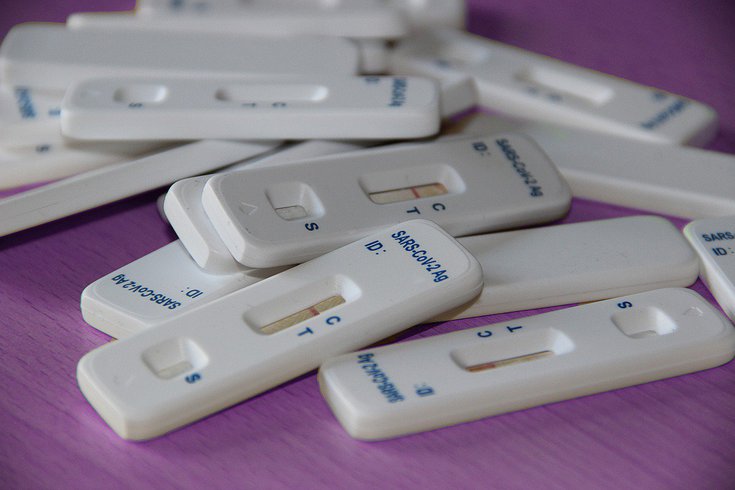
January 13, 2023
 Alexandra Koch/Pixabay
Alexandra Koch/Pixabay
The uptick in COVID-19 cases in the Philadelphia region is being attributed to holiday gatherings and the emergence of a new, highly-contagious omicron subvariant, XBB.1.5. Above, COVID-19 rapid tests.
COVID-19 cases have spiked in the Philadelphia region during the first two weeks of the year. The increase has partly been driven by a new omicron subvariant that the World Health Organization has called the most transmissible yet.
In Philadelphia, new cases have increased by 70% during the last 14 days, according to the New York Times' COVID-19 tracker. The collar counties have seen increases ranging from 7% in Chester County to 23% in Delaware County. In South Jersey, case jumps range from 13% in Burlington County to 42% in Gloucester County.
Hospitalizations also have increased 13% to 22% across the region over the last two weeks.
Dr. Cheryl Bettigole, Philadelphia's health commissioner, attributed the spikes to a mixture of holiday celebrations, cold weather forcing more indoor gatherings, and new, highly contagious omicron subvariants. But she said the city does not have any plans to reinstate any COVID-19 measures.
"Philadelphians understand the precautions needed and have an excellent track record at carrying those precautions out," Bettigole said.
She also stressed that people should receive booster shots, which have been updated to target the omicron variant.
"We are strongly recommending that all Philadelphians take precautions at this time, particularly those who are older, people who are immunosuppressed, and people who live with or have regular contact with people who are at higher risk," Bettigole said. "Those precautions are familiar to us all: wear a high quality mask in crowded indoor spaces, stay home if you are sick, test before seeing someone who is vulnerable, and get your booster shot if you haven’t yet. And if you do develop COVID-19 infection and are at higher risk or over 65, call your doctor to ask about medications that can decrease your risk of complications."
The latest subvariant, XBB.1.5., was responsible for more than 72% of COVID-19 cases in the Northeast, as of late last week. But there's no evidence that it causes more severe illness.
"It's just more effective at binding in our cells, the human cells in the respiratory tract," Dr. Judith O'Donnell, section chief of Infectious Diseases at Penn Presbyterian Medical Center, told 6ABC. "So, when it's a better binder, it's more likely to cause infection because it can latch onto your cells and then attack them, if you will."
There are some fears that the subvariant could spark a playback of last winter, when the omicron variant fueled a surge in hospitalizations and deaths. This year, the rise in COVID-19 cases followed spikes in influenza and respiratory syncytial virus, better known as RSV, prompting some to call the phenomenon a "tripledemic." Yet, flu and RSV cases appear to have peaked.
Dr. Ashish Jha, the White House's coronavirus response coordinator, urged people who have not had COVID-19 recently, or received a booster, to get one to bolster their protection against the new subvariant.
"What we currently know: If you had an infection before July OR Your last vaccine was before bivalent update in September, Your protection against an XBB.1.5 infection is probably not that great," he tweeted last week. "The new bivalent shot is your best protection against both infection & serious illness."
He also encouraged people to wear masks for additional protection.
"Here's what folks can do to minimize risk," he tweeted. "Make sure you are up to date on the bivalent booster (critical).Test before large gatherings or before seeing someone vulnerable (I did over the holidays). Wear a high-quality mask in crowded indoor spaces."